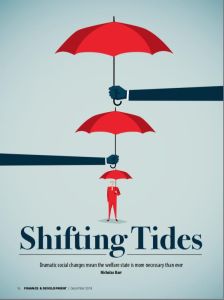Join getAbstract to access the summary!

Join getAbstract to access the summary!
Nicholas Barr
Shifting Tides
Dramatic Social Changes Mean the Welfare State Is More Necessary Than Ever
IMF, 2018
What's inside?
Market failures, climate change and the gig economy make social policy more important than ever.
Recommendation
In the United States, where health insurance and other social benefits are often tied to employment, many people view the “welfare state” as a crutch for the poor. But changes in gender roles, the demonstrated shortcomings of private health insurance and varying employment patterns make such thinking woefully obsolete. Professor Nicholas Barr argues, in this cogent analysis for executives and policy experts, that today’s outdated policies do not reflect new realities that make judicious intervention by governments more important than ever.
Summary
About the Author
Nicholas Barr is a professor at the London School of Economics and Political Science

















Comment on this summary